Connect With Us
Blog
Items filtered by date: December 2024
How Psoriatic Arthritis Affects the Feet
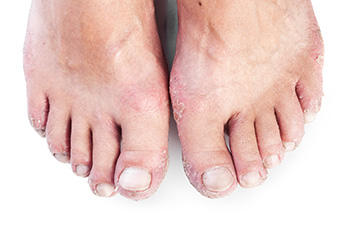
Psoriatic arthritis, or PsA, is a type of arthritis that can cause pain, swelling, and stiffness in the feet, toes, and ankles. People with psoriatic arthritis often experience pain in areas where the foot's tendons or ligaments attach to the bones, particularly in the heel or the bottom of the foot. This can make walking or standing for long periods difficult. Swelling can also affect the toes, making them look sausage-like, which can make daily movements uncomfortable. In addition, changes to the toenails, such as small dents, discoloration, or nails lifting away from the skin, are common. Stiffness in the ankle or foot joints is often worse in the morning or after sitting for a while, which can impede daily activities. Over time, if PsA is not managed properly, it can cause long-term joint damage and limit mobility. A podiatrist can provide treatments to reduce pain, improve foot function, and help you to stay active. If you have foot pain caused by psoriatic arthritis, it is suggested that you schedule an appointment with a podiatrist for an exam and treatment options.
Arthritis can be a difficult condition to live with. If you are seeking treatment, contact one of our podiatrists from Comprehensive Foot & Ankle Centers. Our doctors can provide the care you need to keep you pain-free and on your feet.
Arthritic Foot Care
Arthritis is a joint disorder that involves the inflammation of different joints in your body, such as those in your feet. Arthritis is often caused by a degenerative joint disease and causes mild to severe pain in all affected areas. In addition to this, swelling and stiffness in the affected joints can also be a common symptom of arthritis.
In many cases, wearing ill-fitting shoes can worsen the effects and pain of arthritis. Wearing shoes that have a lower heel and extra room can help your feet feel more comfortable. In cases of rheumatoid arthritis, the arch in your foot may become problematic. Buying shoes with proper arch support that contour to your feet can help immensely.
Alleviating Arthritic Pain
- Exercises that stretch the foot can prevent further pain and injury and increase mobility
- Most of the pain can be alleviated with anti-inflammatory drugs, heat, and topical medications
- Massages can help temporarily alleviate pain.
It is best to see your doctor for the treatment that is right for your needs and symptoms. Conditions vary, and a podiatrist can help you determine the right method of care for your feet.
If you have any questions, please feel free to contact our offices located in Shepherdsville and Louisville, KY . We offer the newest diagnostic tools and technology to treat your foot and ankle needs.
Plantar Fasciitis and Motion
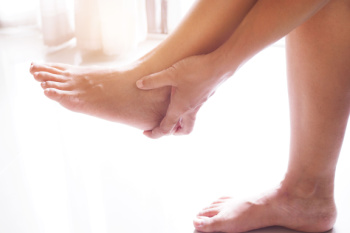
Plantar fasciitis is a condition tied closely to the biomechanics of the foot. The plantar fascia, a thick band of tissue under the foot, helps support the arch and absorbs impact during walking. It starts at the heel bone and fans out toward the toes. When walking, this tissue stretches and recoils, maintaining foot stability and aiding motion. Improper gait, like uneven pressure on the foot, can strain the fascia. Over time, this strain may lead to tiny tears, causing pain and inflammation. The body repairs these tears with collagen, but repetitive strain may disrupt proper healing, leading to chronic pain. Biomechanical issues, such as flat feet or tight calf muscles, can worsen the problem. Proper treatment, including stretching, wearing supportive footwear, and more, helps. If you have ongoing heel pain, it is suggested that you see a podiatrist to identify the underlying cause, and get expert care
Plantar fasciitis is a common foot condition that is often caused by a strain injury. If you are experiencing heel pain or symptoms of plantar fasciitis, contact one of our podiatrists from Comprehensive Foot & Ankle Centers. Our doctors can provide the care you need to keep you pain-free and on your feet.
What Is Plantar Fasciitis?
Plantar fasciitis is one of the most common causes of heel pain. The plantar fascia is a ligament that connects your heel to the front of your foot. When this ligament becomes inflamed, plantar fasciitis is the result. If you have plantar fasciitis you will have a stabbing pain that usually occurs with your first steps in the morning. As the day progresses and you walk around more, this pain will start to disappear, but it will return after long periods of standing or sitting.
What Causes Plantar Fasciitis?
- Excessive running
- Having high arches in your feet
- Other foot issues such as flat feet
- Pregnancy (due to the sudden weight gain)
- Being on your feet very often
There are some risk factors that may make you more likely to develop plantar fasciitis compared to others. The condition most commonly affects adults between the ages of 40 and 60. It also tends to affect people who are obese because the extra pounds result in extra stress being placed on the plantar fascia.
Prevention
- Take good care of your feet – Wear shoes that have good arch support and heel cushioning.
- Maintain a healthy weight
- If you are a runner, alternate running with other sports that won’t cause heel pain
There are a variety of treatment options available for plantar fasciitis along with the pain that accompanies it. Additionally, physical therapy is a very important component in the treatment process. It is important that you meet with your podiatrist to determine which treatment option is best for you.
If you have any questions, please feel free to contact our offices located in Shepherdsville and Louisville, KY . We offer the newest diagnostic and treatment technologies for all your foot care needs.
Facts About Rheumatoid Arthritis in the Feet
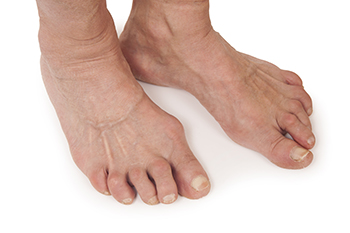
Rheumatoid arthritis, or RA, is an autoimmune disease that affects joints throughout the body including the feet. In RA, the immune system attacks the lining of the joints causing inflammation, pain, and swelling. In the feet, RA typically affects the toes, midfoot, and ankles, often leading to deformities such as hammer toes or bunions. Over time, the cartilage in the joints can wear down resulting in limited mobility and increased pain. People with RA may also experience stiffness, especially in the morning, and difficulty walking or standing for long periods. The inflammation in the feet can worsen with activity making it challenging to wear shoes comfortably. Early diagnosis and treatment are vital in managing symptoms and preventing further damage. Treatment options may include medications and surgery to improve foot function and quality of life. If you have this condition, it is suggested that you confer with a podiatrist who can help you manage RA.
Because RA affects more than just your joints, including the joints in your feet and ankles, it is important to seek early diagnosis from your podiatrist if you feel like the pain in your feet might be caused by RA. For more information, contact one of our podiatrists of Comprehensive Foot & Ankle Centers. Our doctors will assist you with all of your podiatric concerns.
What Is Rheumatoid Arthritis?
Rheumatoid Arthritis (RA) is an autoimmune disorder in which the body’s own immune system attacks the membranes surrounding the joints. Inflammation of the lining and eventually the destruction of the joint’s cartilage and bone occur, causing severe pain and immobility.
Rheumatoid Arthritis of the Feet
Although RA usually attacks multiple bones and joints throughout the entire body, almost 90 percent of cases result in pain in the foot or ankle area.
Symptoms
- Swelling and pain in the feet
- Stiffness in the feet
- Pain on the ball or sole of feet
- Joint shift and deformation
Diagnosis
Quick diagnosis of RA in the feet is important so that the podiatrist can treat the area effectively. Your doctor will ask you about your medical history, occupation, and lifestyle to determine the origin of the condition. Rheumatoid Factor tests help to determine if someone is affected by the disease.
If you have any questions please feel free to contact our offices located in Shepherdsville and Louisville, KY . We offer the newest diagnostic and treatment technologies for all your foot and ankle needs.
Get Professional Care for a Broken Foot or Ankle
Customized Orthotics for Kids With JIA
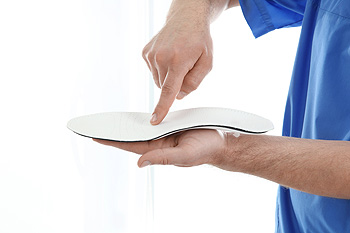
Juvenile idiopathic arthritis, or JIA, is an autoimmune disease that causes chronic inflammation in children’s joints, including the feet. This condition can lead to joint pain, stiffness, and swelling, particularly in the ankles and feet, making movement challenging and uncomfortable. For kids with JIA, customized preformed orthotics can provide essential support. These orthotics start with a pre-made structure, which is then tailored to the child’s specific foot shape and needs, offering personalized comfort and stability. By adjusting the orthotic’s arch support, heel cushioning, and alignment, these inserts help reduce pressure on inflamed joints and improve gait, which is often affected in JIA. Customized preformed orthotics can relieve pain, reduce joint stress, and enhance mobility, making daily activities more manageable. If your child has JIA, it is suggested that you schedule an appointment with a podiatrist to discuss if orthotics can help manage pain in their feet and ankles.
If you are having discomfort in your feet and would like to try orthotics, contact one of our podiatrists from Comprehensive Foot & Ankle Centers. Our doctors can provide the care you need to keep you pain-free and on your feet.
What Are Orthotics?
Orthotics are inserts you can place into your shoes to help with a variety of foot problems such as flat feet or foot pain. Orthotics provide relief and comfort for minor foot and heel pain but can’t correct serious biomechanical problems in your feet.
Over-the-Counter Inserts
Orthotics come in a wide variety of over-the-counter inserts that are used to treat foot pain, heel pain, and minor problems. For example, arch supports can be inserted into your shoes to help correct overarched or flat feet, while gel insoles are often used because they provide comfort and relief from foot and heel pain by alleviating pressure.
Prescription Orthotics
If over-the-counter inserts don’t work for you or if you have a more severe foot concern, it is possible to have your podiatrist prescribe custom orthotics. These high-quality inserts are designed to treat problems such as abnormal motion, plantar fasciitis, and severe forms of heel pain. They can even be used to help patients suffering from diabetes by treating foot ulcers and painful calluses and are usually molded to your feet individually, which allows them to provide full support and comfort.
If you are experiencing minor to severe foot or heel pain, it’s recommended to speak with your podiatrist about the possibilities of using orthotics. A podiatrist can determine which type of orthotic is right for you and allow you to take the first steps towards being pain-free.
If you have any questions please contact our offices located in Shepherdsville and Louisville, KY . We offer the newest diagnostic and treatment technologies for all your foot and ankle needs.
Causes and Prevention of Ingrown Toenails
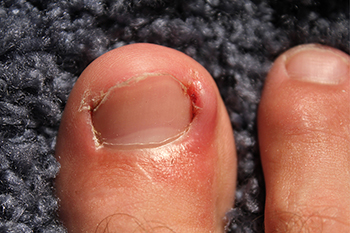
An ingrown toenail occurs when the edge of the toenail grows into the surrounding skin, causing pain, swelling, and redness. This condition most commonly affects the big toe but can occur on any toe. The main causes of ingrown toenails include improper nail trimming, where the nails are cut too short or rounded at the edges, and wearing tight or ill-fitting shoes that put pressure on the toes. Injuries to the toe, such as stubbing, can also lead to an ingrown toenail. Prevention involves trimming toenails straight across to avoid sharp edges that can dig into the skin. Wearing shoes that fit properly and allow for adequate toe room is also essential. Keeping the feet clean and dry, and avoiding excessive pressure on the toes, can further help prevent ingrown toenails and reduce the risk of infection. If you have an ingrown toenail, it is strongly suggested that you promptly contact a podiatrist who can offer you appropriate treatment solutions.
Ingrown toenails can become painful if they are not treated properly. For more information about ingrown toenails, contact one of our podiatrists of Comprehensive Foot & Ankle Centers. Our doctors can provide the care you need to keep you pain-free and on your feet.
Ingrown Toenails
Ingrown toenails occur when a toenail grows sideways into the bed of the nail, causing pain, swelling, and possibly infection.
Causes
- Bacterial infections
- Improper nail cutting such as cutting it too short or not straight across
- Trauma to the toe, such as stubbing, which causes the nail to grow back irregularly
- Ill-fitting shoes that bunch the toes too close together
- Genetic predisposition
Prevention
Because ingrown toenails are not something found outside of shoe-wearing cultures, going barefoot as often as possible will decrease the likeliness of developing ingrown toenails. Wearing proper fitting shoes and using proper cutting techniques will also help decrease your risk of developing ingrown toenails.
Treatment
Ingrown toenails are a very treatable foot condition. In minor cases, soaking the affected area in salt or antibacterial soaps will not only help with the ingrown nail itself, but also help prevent any infections from occurring. In more severe cases, surgery is an option. In either case, speaking to your podiatrist about this condition will help you get a better understanding of specific treatment options that are right for you.
If you have any questions please feel free to contact our offices located in Shepherdsville and Louisville, KY . We offer the newest diagnostic and treatment technologies for all your foot and ankle needs.
Blog Archives
- July 2025
- June 2025
- May 2025
- April 2025
- March 2025
- February 2025
- January 2025
- December 2024
- November 2024
- October 2024
- September 2024
- August 2024
- July 2024
- June 2024
- May 2024
- April 2024
- March 2024
- February 2024
- January 2024
- December 2023
- November 2023
- October 2023
- September 2023
- August 2023
- July 2023
- June 2023
- May 2023
- April 2023
- March 2023
- February 2023
- January 2023
- December 2022
- November 2022
- October 2022
- September 2022
- August 2022
- July 2022
- June 2022
- May 2022
- April 2022
- March 2022
- February 2022
- January 2022
- December 2021
- November 2021
- October 2021
- September 2021
- August 2021
- July 2021
- June 2021
- May 2021
- April 2021
- February 2021
- January 2021
- December 2020

